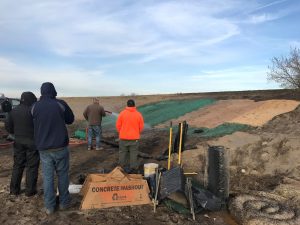Port staff gets hands-on stormwater training

CESCL trainees watch as their instructor tests the effectiveness of their stormwater mitigation tools
With hundreds of acres of water-adjacent property to manage, we take stormwater seriously at the Port of Vancouver USA.
Our programs not only meet but often exceed regulations, and that takes a lot of people with a lot of ingenuity. To help keep our staff up to date on the latest requirements and technologies, we partner with local environmental training companies to train appropriate staff to be Certified Erosion Sediment Control Leads (CESCL).
CESCL training is a two-day class that covers the laws that regulate stormwater runoff from construction sites, how erosion and sediment transfer happen, and tools and techniques that can be used to ensure construction stormwater runoff is controlled and treated. Participants also learn about the different permits that are required for projects. The port is covered by Western Washington Phase II Municipal Stormwater, Industrial Stormwater and Construction Stormwater General permits, as well as other permits required for tenant operations. Each of these permits have different requirements and reporting processes; having intimate knowledge of each is essential for a site as large as the port, which covers more than 1,600 acres.
The second day of CESCL training is a hands-on assessment to ensure participants can implement the sediment and erosion control techniques learned in the classroom at a simulated construction site. Instructors take the students to a site where they install the equipment they’ve learned about and work as a team to ensure the site does not discharge dirty stormwater runoff. After the different tools have been installed, the instructor uses a water truck to spray down the site and test the newly installed source controls to assess if they meet the requirements of the Construction Stormwater General permit.
It’s no easy feat managing stormwater runoff for such a large area, but the Port of Vancouver is committed to providing our employees the education and hands-on experience they need to help balance sustainable industrial activity with responsible waterway stewardship.
